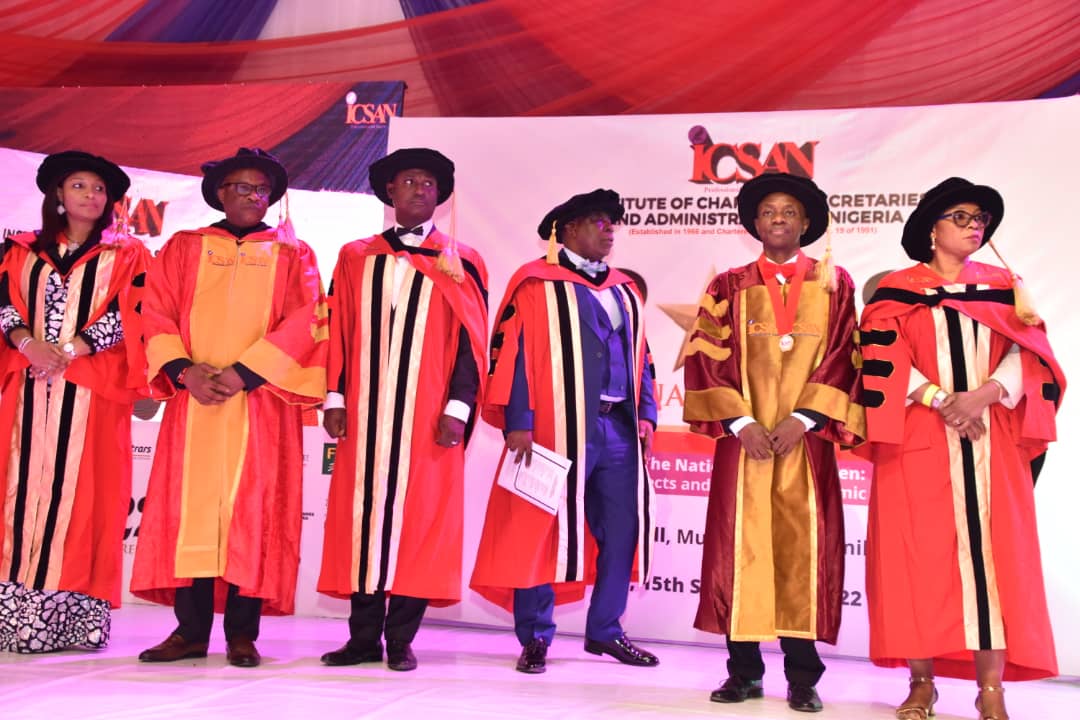
Director-General, Budget Office of the Federation, Ben Akabueze, expressed concern about the country’s rising debt profile and assured that the government would bring down debt service costs to free sufficient resources for programmes that would enhance development.
Akabueze, who was represented by his Technical Adviser, Prof. Olumide Ayodele, spoke on ‘the National Debt Burden: Causes, Effects and Realistic Economic Solutions,’ at the 46th yearly conference of the Institute of Chartered Secretaries and Administrators of Nigeria (ICSAN).
Stating that the focus of the conference was apt and timely to help the government address significant fiscal challenges, he mentioned that public debt at N32.9 trillion in 2020 rose to N39.6 trillion in 2021 with a total public debt amounting to N41.6 trillion in March 2022, while debt service amounts to $7.7 billion in 2021, an increase from $6.4 billion in 2020.
According to him, because public debt is largely domestic, debt service is a significant proportion of the debts.
He said even though the level of public debt is high in Nigeria, the budget office is of the view that public debt remains moderate and within sustainable limits going by international standards.
On what the government has been doing to manage debt, he said the focus of the government was to maximise domestic borrowing using longer-term instruments and maximise funding from concessional sources, from multilateral and bilateral windows while replacing external borrowing with longer tenure domestic borrowing in a way that would not crowd out private sector investments.
Also, he said the government is focusing on the issuance of promissory notes to settle arrears with key reforms to improve revenue collections, which he said are yielding results with significant improvements from non-oil revenue.
According to him, “improvement in revenue collection will reduce deficits significantly and the need to borrow and debt service burden. It is important to ensure the public debt is sustainable, revenue must be enhanced and improving expenditure management and block revenue leakages.
“As of the end of 2021, public debt as a ratio of 23 per cent, is within the 55 per cent threshold recommended by the IMF and World Bank and is far lower than the 70 per cent W/A monetary zone convergence threshold and our self-imposed limits of 40 per cent.
In addition, the exposure of the public debt portfolio to exchange rate risk is also moderate, because external debts account for about 40 per cent of total debt in 2021 and the target ratio for 2023 is 30 per cent.”
He mentioned some measures to urgently avert the crisis on the country’s rising debts, stating that it was critical for immediate implementation of the Steve Oronsaye report towards cutting the cost of governance.
He said the government’s target over the medium term was to grow the revenue to GDP ratio from eight per cent to 15 per cent by 2025.
According to him, the government is introducing measures to reduce recurrent spending and to limit government-owned enterprises’ expenditure to about 50 per cent.
This, according to him, is to reduce waste and manage expenditure better.
President and Chairman of Council, ICSAN, Taiwo ’Gbenga Owokalade, who expressed concern over the nation’s current debt profile, said it prognosticates an inauspicious omen for national progress, development and sustainability.
He said national sustainability could not be talked about if the nation cannot survive except by taxing the resources that should be available for the future.
Noting that Nigeria was struggling to service the interest on debt and repayment of the principal, he said with the grim statistics portraying such huge fiscal deficits, there was no gainsaying the fact that the matter has come to a head.
According to him, while it is remarkable that incurring debt is not by itself a negative development, the size of the debt vis-à-vis the national income, cum the nature of the projects to which the obtained loans are applied constitute pertinent issues for serious consideration.
He said: “The pertinent questions now are “Is the borrowing spree sustainable? How do we break free from this debilitating burden of debt? What governance model can we adopt to soar above this debt trap and still manage to procure growth and development? One can go on and on with these types of questions which revolve around the perplexing debt conundrum.
“One good thing, as suggested by the theme itself, is that we are not only here to identify the roots and causes of the problem, we are even much more committed to distilling from our discourse and brainstorming today practicable solutions which we can offer to our numerous stakeholders in forms of recommendations.”



